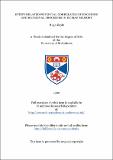Event-related potential correlates of encoding and retrieval processes in human memory
Abstract
In
electrophysiological research over the last few years there has been
a
growing tendency to utilise the Event-Related Potential as a tool in the
study of cognitive processes, especially those which are well defined and
understood. Over the last few years too, the study of encoding and
retrieval processes in human memory has achieved a certain measure of
consensus, in that many researchers have suggested that retrieval
performance depends largely upon the type of encoding process performed
upon the item at presentation, in particular it is suggested that the
degree to which the physical characteristics of a stimulus item are
analysed will largely determine whether the item can later be recognised
and that the degree to which the semantic content of the item is analysed
will
largely determine whether the item can later be recalled. The present
series of experiments sought to determine whether there existed ERP
correlates of the two
types of encoding process and of the two related
retrieval processes, recognition and recall.
In the first experiment, ERPs generated by words which were thought to
have been analysed at a physical level, as determined by whether they were
recognised 24 hours later, were compared with ERPs generated by words
thought not to have received such processing, during both initial and
subsequent presentation. The ERP encoding data indicated that enhancement
was seen in late positive activity generated at Fz by words which were
later
recognised with a high degree of confidence. This was taken to imply
that the enhanced positivity was generated by elaborative encoding
processes. The ERP retrieval data indicated: 1) that between 300-500 msec
post stimulus, words which were correctly recognised as "old" generated
potentials of greater positivity than words which were correctly recognised
as "new". This was
interpreted as an ERP index of a retrieval process based
on
familiarity only. 2) Between 500-924 msec post stimulus, items which
may have been recognised due to the retrieval of encoding context generated
greater positivity than items recognised on the basis of familiarity alone.
In experiment 2, the basic design was repeated with the exception that
a
cognitive task was interposed between trials to ensure that all
processing related to subsequent memory performance was restricted to the
recording epoch. ERPs were recorded only during the initial presentation
of stimulus
items, and those generated by words later recognised were again
compared with those generated by items not recognised or recognised with
low confidence. The ERP data revealed the same enhanced late positivity at
Fz
generated by words correctly recognised with a high degree of
confidence, although, as in experiment 1, the effect was small.
In
experiment 3, ERPs were again only recorded to words during the
first
presentation, but were this time compared on the basis of whether
words had been recalled or not. It was
thought that if subsequent recall
of items
depends on elaborative processing at presentation, this
manipulation would ensure that ERPs generated by recalled words would
reflect
activity selective to elaborative encoding. The recording epoch was
also lengthened in order that the ERPs might be sensitive to slow, long
latency effects. The data indicated that words which were recalled
generated ERPs of significantly greater positivity in the region 800-1400
msec at Fz than did words not recalled.
In
experiment 4, ERPs generated by words during retrieval were
recorded, and in this case ERPs generated by words whose experimentally
learned associates were recalled from memory, were compared with ERPs
generated by words whose associates were not recalled. It was suggested
that since recall depends upon retrieval of encoding context, ERPs
generated by words whose learned associates were recalled, should reflect
such
processing. The ERP data showed that words whose associates were
recalled, generated activity of greater positivity than words whose
associates were not
recalled, from 500 msec onwards at all three midline
sites.
It is concluded from these experiments that at encoding, the
activation of elaborative processing is reflected by an enhancement of the
ERP
activity at Fz from approx. 500 msec onwards, and that at retrieval, 1)
the activation of the "familiarity-checking" process generates enhanced
positivity at all midline sites between 300-500 msec, and 2) that the
"retrieval of encoding context" process generates enhanced positivity from
500 msec onwards. These data are related further in the conclusion to both
physiological and cognitive theories of human memory.
Type
Thesis, MSc Master of Science
Collections
Items in the St Andrews Research Repository are protected by copyright, with all rights reserved, unless otherwise indicated.

